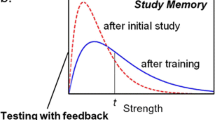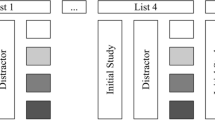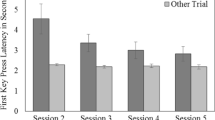Abstract
Two experiments determined whether metamemory judgments invoking covert retrieval practice for a list of unrelated paired associate words led to the facilitation of learning a subsequent list. Three types of relation between successive lists were compared: negative transfer (A-B, A-D); a control for item-specific proactive interference (A-B, C-D); and repetition (A-B, A-B). Experiment 1 showed that the benefit of retrieval practice relative to restudying was equivalent for overt and covert retrieval in the negative transfer paradigm (A-B, A-D). Both types of retrieval minimized intrusions of first list responses in the cued recall of the second list. Experiment 2 showed that memory enhancement following covert retrieval was equivalent for new (C-D) and repeated (A-B) lists. The results are consistent with theories of the forward testing effect (FTE) that assume retrieval practice insulates subsequent learning from proactive interference and provides self-assessment feedback that may lead to more efficient encoding in future learning. Challenges in accounting for the impact of a substantial number of moderators of the FTE are reviewed.
Similar content being viewed by others
Data availability
The data that support the findings of this study are available from the corresponding author, MC, upon reasonable request.
References
Ahn, D., & Chan, J. C. K. (2022). Does testing enhance new learning because it insulates against proactive interference? Memory & Cognition. https://doi.org/10.3758/s13421-022-01273-7
Allen, G. A., & Arbak, C. J. (1976). The priority effect in the A-B, A-C paradigm and subjects’ expectations. Journal of Verbal Learning and Verbal Behavior, 15(4), 381–385. https://doi.org/10.1016/S0022-5371(76)90033-5
Balota, D., Yap, M., Cortese, M., Hutchison, K., Kessler, B., Loftis, B., Neely, J., Nelson, D., Simpson, G., & Treiman, R. (2007). The English lexicon project. Behavior Research Methods, 39(3), 445–459. https://doi.org/10.3758/BF03193014
Bäuml, K.-H.T., & Kliegl, O. (2013). The critical role of retrieval processes in release from proactive interference. Journal of Memory and Language, 68, 39–53. https://doi.org/10.1016/j.jml.2012.07.006
Carpenter, S. K., Pashler, H., & Vul, E. (2006). What types of learning are enhanced by a cued recall test? Psychonomic Bulletin & Review, 13(5), 826–830. https://doi.org/10.3758/BF03194004
Chan, J., Meissner, C., & Davis, S. (2018). Retrieval potentiates new learning: A theoretical and meta-analytic review. Psychological Bulletin, 144(11), 1111–1146. https://doi.org/10.1037/bul0000166
Cho, K. W., Neely, J. H., Crocco, S., & Vitrano, D. (2017). Testing enhances both encoding and retrieval for both tested and untested items. The Quarterly Journal of Experimental Psychology, 70(7), 1211–1235. https://doi.org/10.1080/17470218.2016.1175485
Darley, C. F., & Murdock, B. B. (1971). Effects of prior free recall testing on final recall and recognition. Journal of Experimental Psychology, 91(1), 66–73. https://doi.org/10.1037/h0031836
Endres, T., & Renkl, A. (2015). Mechanisms behind the testing effect: A empirical investigation of retrieval practice in meaningful learning. Frontiers in Psychology, 6, 1–6. https://doi.org/10.3389/fpsyg.2015.01054
Finley, J. R., & Benjamin, A. S. (2012). Adaptive and qualitative changes in encoding strategy with experience: Evidence from the test-expectancy paradigm. Journal of Experimental Psychology. Learning, Memory, and Cognition, 38(3), 632–652. https://doi.org/10.1037/a0026215
Greving, E., & Richter, T. (2018). Examining the testing effect in university teaching: Retrievability and question format matter. Frontiers in Psychology, 9, 1–10. https://doi.org/10.3389/fpsyg.2018.02412
Kubik, V., Koslowski, K., Schubert, T., & Aslan, A. (2022). Metacognitive judgments can potentiate new learning: The role of covert retrieval. Metacognition and Learning, 1–21. https://doi.org/10.1007/s11409-022-09307-w
Landauer, T. K., & Dumais, S. T. (1997). A solution to Plato’s problem: The latent semantic analysis theory of acquisition, induction, and representation of knowledge. Psychological Review, 104, 211–240. https://doi.org/10.1037/0033-295X.104.2.211
Lee, H. S., & Ha, H. (2019). Metacognitive judgments of prior material facilitate learning new material: The forward effect of metacognitive judgments in inductive learning. Journal of Educational Psychology, 111(7), 1189–1201. https://doi.org/10.1037/edu0000339
Mulligan, N. W., Buchin, Z. L., & West, J. T. (2020). Assessing why the testing effect is moderated by experimental design. Journal of Experimental Psychology: Learning, Memory, and Cognition, 46(7), 1293–1308. https://doi.org/10.1037/xlm0000787
Pastötter, B., & Bäuml, K. T. (2014). Retrieval practice enhances new learning: The forward effect of testing. Frontiers in Psychology, 5, 1–5. https://doi.org/10.3389/fpsyg.2014.00286
Pastötter, B., Schicker, S., Niedernhuber, J., & Bäuml, K.-H.T. (2011). Retrieval during learning facilitates subsequent memory encoding. Journal of Experimental Psychology: Learning, Memory, & Cognition, 37, 287–297. https://doi.org/10.1037/a0021801
Pastötter, B., Engel, M., & Frings, C. (2018). The forward effect of testing: Behavioral evidence for the reset-of-encoding hypothesis using serial position analysis. Frontiers in Psychology, 9, 1197. https://doi.org/10.3389/fpsyg.2018.01197
Peirce, J. W. (2009). Generating stimuli for neuroscience using PsychoPy. Frontiers in Neuroinformatics, 2(10), 1–8. https://doi.org/10.3389/neuro.11.010.2008
Racsmány, M., Szőllősi, Á., & Bencze, D. (2017). Retrieval practice makes procedure from remembering: An automatization account of the testing effect. Journal of Experimental Psychology: Learning, Memory, and Cognition. Advance online publication, 1–10. https://doi.org/10.1037/xlm0000423
Rhodes, M. G., & Tauber, S. K. (2011). The influence of delaying judgments of learning on metacognitive accuracy: A meta-analytic review. Psychological Bulletin, 137(1), 131–148. https://doi.org/10.1037/a0021705
Rickard, T. C., & Pan, S. C. (2017). A dual memory theory of the testing effect. Psychonomic Bulletin & Review, 1–23. https://doi.org/10.3758/s13423-017-1298-4
Rowland, C. A. (2014). The effect of testing versus restudy on retention: A meta-analytic review of the testing effect. Psychological Bulletin, 140(6), 1432–1463. https://doi.org/10.1037/a0037559
Smith, M. A., Roediger, H. L., III., & Karpicke, J. D. (2013). Covert retrieval practice benefits retention as much as overt retrieval practice. Journal of Experimental Psychology: Learning, Memory, and Cognition, 39(6), 1712–1725. https://doi.org/10.1037/a0033569
Sundqvist, M. L., Mäntylä, T., & Jönsson, F. U. (2017). Assessing boundary conditions of the testing effect: On the relative efficacy of covert vs. overt retrieval. Frontiers in Psychology, 8, 1–15. https://doi.org/10.3389/fpsyg.2017.01018
Szpunar, K. K., McDermott, K. B., & Roediger, H. L. (2008). Testing during study insulates against the buildup of proactive interference. Journal of Experimental Psychology: Learning, Memory, and cognition, 34(6), 1392–1399. https://doi.org/10.1037/a0013082
Tauber, S. K., Witherby, A. E., Dunlosky, J., Rawson, K. A., Putnam, A. L., & Roediger, H. L., III. (2018). Does covert retrieval benefit learning of key-term definitions? Journal of Applied Research in Memory and Cognition, 7(1), 106–115. https://doi.org/10.1016/j.jarmac.2016.10.004
Trumbo, M. C. S., McDaniel, M. A., Hodge, G. K., Jones, A. P., Matzen, L. E., Kittinger, L. I., Kittinger, R. S., & Clark, V. P. (2021). Is the testing effect ready to be put to work? Evidence from the laboratory to the classroom. Translational Issues in Psychological Science, 7(3), 332–355. https://doi.org/10.1037/tps0000292
Tulving, E., & Watkins, M. J. (1974). On negative transfer: Effects of testing one list on the recall of another. Journal of Verbal Learning and Verbal Behavior, 13, 181–193. https://doi.org/10.1016/S0022-5371(74)80043-5
Wahlheim, C. N. (2015). Testing can counteract proactive interference by integrating competing information. Memory & Cognition, 43(1), 27–38. https://doi.org/10.3758/s13421-014-0455-5
Yang, C., Potts, R., & Shanks, D. R. (2018). Enhancing learning and retrieval of new information: A review of the forward testing effect. NPJ Science of Learning, 3(8). https://doi.org/10.1038/s41539-018-0024-y
Funding
The authors have no relevant financial or non-financial interests to disclose.
Author information
Authors and Affiliations
Contributions
Conceptualization: Monique Carvalho, Harvey Marmurek; Data curation: Monique Carvalho, Alysha Cooper; Formal analysis and investigation: Monique Carvalho, Alysha Cooper, Harvey Marmurek; Methodology: Monique Carvalho, Alysha Cooper, Harvey Marmurek; Project administration: Monique Carvalho, Harvey Marmurek; Writing – original draft preparation: Monique Carvalho; Writing—reviewing and editing: Harvey Marmurek; Supervision Harvey Marmurek.
Corresponding author
Ethics declarations
Declaration of Interest
The authors did not receive support from any organization for the submitted work.
Competing Interests
The authors of this paper have no competing interests.
Additional information
Publisher's note
Springer Nature remains neutral with regard to jurisdictional claims in published maps and institutional affiliations.
Rights and permissions
Springer Nature or its licensor (e.g. a society or other partner) holds exclusive rights to this article under a publishing agreement with the author(s) or other rightsholder(s); author self-archiving of the accepted manuscript version of this article is solely governed by the terms of such publishing agreement and applicable law.
About this article
Cite this article
Carvalho, M., Cooper, A. & Marmurek, H.H.C. Covert retrieval yields a forward testing effect across levels of successive list similarity. Metacognition Learning 18, 847–861 (2023). https://doi.org/10.1007/s11409-023-09348-9
Received:
Accepted:
Published:
Issue Date:
DOI: https://doi.org/10.1007/s11409-023-09348-9




